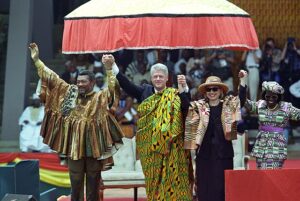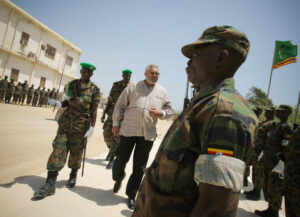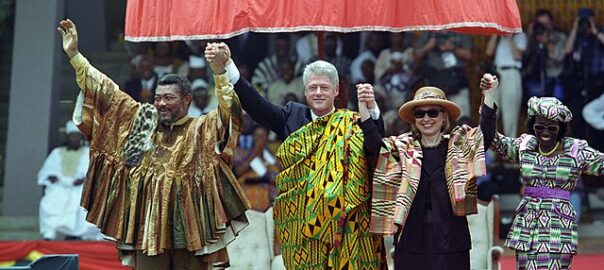Av: Martins Kwazema, FD
On December 31st, 1981, former president of Ghana Jerry Rawlings in a radio address after the historic coup that ousted President Limann from power, outlined the basic tenets of the revolutionary Afrotopian society he envisioned for Ghana. Rawlings’ objective was to unleash a popular revolution that would pursue and accomplish what Felwine Sarr describes as an occurrence of “Afrotopia” in governance in Ghana. In his seminal work titled Afrotopia, Felwine Sarr argues that the future is a site that does not yet exist, but which one can already shape within a mental space. He further asserts that Afrotopos is Africa’s atopos: that is, the as-yet-inhabited site of a particular future occurrence of Africa to come. To realize this atopos in Africa, Sarr argues that investment in thought and imagination is primal. The Greek rendition of the term atopos speaks somewhat of a singularity that is incomparable to anything else “not because” of its authenticity and difference among others, but rather because it is “different from everything that is different from others.” The machination of political and economic engineering during the December 31st Revolution in Ghana represents one of such sparks of this “singular incomparability” in the historical evolution of West Africa’s political economy in the 1980s. In framing Rawlings’ Afrotopia for participatory democracy during the revolution, it is important to note that the initial objectives constituted a national democratic phase which was largely a creation of the PNDC government’s extremist “leftist faction” whose socialist lexicography reflected Chairman Mao Tse-Tung’s conceptualization of ‘New Democracy’. They had also earlier established themselves among Ghana’s progressive movement as proponents of Marxist socialism. They anticipated a path to achieving Rawlings Afrotopia for Participatory Democracy that would predominantly reflect the establishment and sustenance of a “class struggle” which would eventually emerge in a hegemony of the working-class across Ghana’s public and private institutions.

President Clinton, First Lady Hillary Rodham Clinton, President Jerry John Rawlings and his wife Nana Konadu Agyeman Rawlings raise their arms together on the dais in Accra, Ghana. Sharon Farmer / White House Photograph Office. Wikimedia commons
On the other hand, Rawlings who was ethnically Ewe envisioned the trajectory to his Afrotopian imaginary for participatory democracy to encompass more of “class harmonization” rather than a “class struggle”. Rawlings envisioned his Afrotopian society in Ghana to reflect one that effectively engaged “all classes” to save Ghana from its dystopian outlook and despondent positionality among the comity of nations towards the achievement of higher ideals of freedom and equality in the of the yet-to-come Ghanaian society. The dissonance that ensued between the PNDC factions was further heightened by the weakness of the leftist faction and the Ghana’s progressive leftist faction to develop sustainable solutions to the crises impacted by the drought and famine that hit Ghana’s economy in by 1982. Rawlings criticized the Ghanaian Left for their propagation of “empty theories” as they struggled to translate their “heady mix of dependency theory and economic nationalism” into workable policy designs.

AU Special Representative to Somalia Jerry Rawlings inspects a guard of honour at the African Union Mission in Somalia (AMISOM) headquarters following his arrival in the Somali capital 7 February for a two-day visit. AU-UN IST PHOTO / STUART PRICE, Wikimedia Commons
Consequently, Rawlings executed one of the most significant feats in economic and political pragmatism in West Africa’s history by turning to the political orientations of the Right and the macroeconomics of neoliberal economics. His adoption of the neoliberal IMF and World Bank sponsored structural adjustment programmed by March 1983 represented a blow and a betrayal to Ghana progressives and the Ghanaian Left in general. His new governance posture from March 1983 onwards has been widely considered an undemocratic as he adopted an authoritarian stance to grasp a firmer hold on power and to silence the multiple attempts to usurp his vision for the revolution and his pursuit for his Afrotopian model for participatory democracy in Ghana. His machinations in state engineering resulted in a form of governance, which I have termed an “autocratic technocracy”. It is interesting to note that it was under this form of alternative system of governance that Ghana achieved its so-called economic success story lauded by the IMF and World Bank in the 1990s, the extent towards which it attained the acronym, “Japan of Africa”.
Källor:
Anthony Aubynn, Sustainable Development: The Implications of Structural Adjustment Programme on Sub-Saharan Africa’s environment: A Case of Ghana’s Experience (Tampere: University of Tampere, 1994)
Eboe Hutchful, Ghana’s Adjustment Experience: The Paradox of Reform (Geneva and Oxford: UNRISD and James Currey, 2002)
Haynes, J. (1987). From ‘Revolution’ to ‘Pragmatism’ in Ghana. Politics, 7(2), 22-27. https://doi.org/10.1111/j.1467-9256.1987.tb00260.x
Mao Tse-Tung, On New Democracy (Beijing: Foreign Languages Press, 1954).
Paul Nugent, Big Men, Small Boys and Politics in Ghana: Power, Ideology, and the Burden of History in Rawlings’ Ghana, 1982–1994 (London and New York: Pinter Publishing Limited, 1995).
Information Services Department, A Revolutionary Journey: Selected Speeches of Flt-Lt Jerry John Rawlings, Chairman of the PNDC, December 31, 1981–December 31, 1982, vol. 2 (Accra: Information Services Department, 1982) cited in Kevin Shillington, Ghana and the Rawlings Factor (New York: St Martin’s Press, 1992).
Matiz Grinko, “Do not aspire to be different from others, be an “atopos,” accessed 16 January 2023,
https://medium.com/@matizgrinkoxy/do-not-aspire-to-be-different-from-others-be-an-atopos-48a7e731bb8e.
Martins Kwazema, has a Ph.D in General History. His doctoral thesis titled "The Irony of Economic Miracle: Past Futures of Ghana's December 31st revolution" theorized a conceptual framework for investigating the past termed the Past Futures Framework. The thesis then applied the framework to situate and investigate the past futures of Rawlings December 31st revolution in Ghana 1982-1992.


